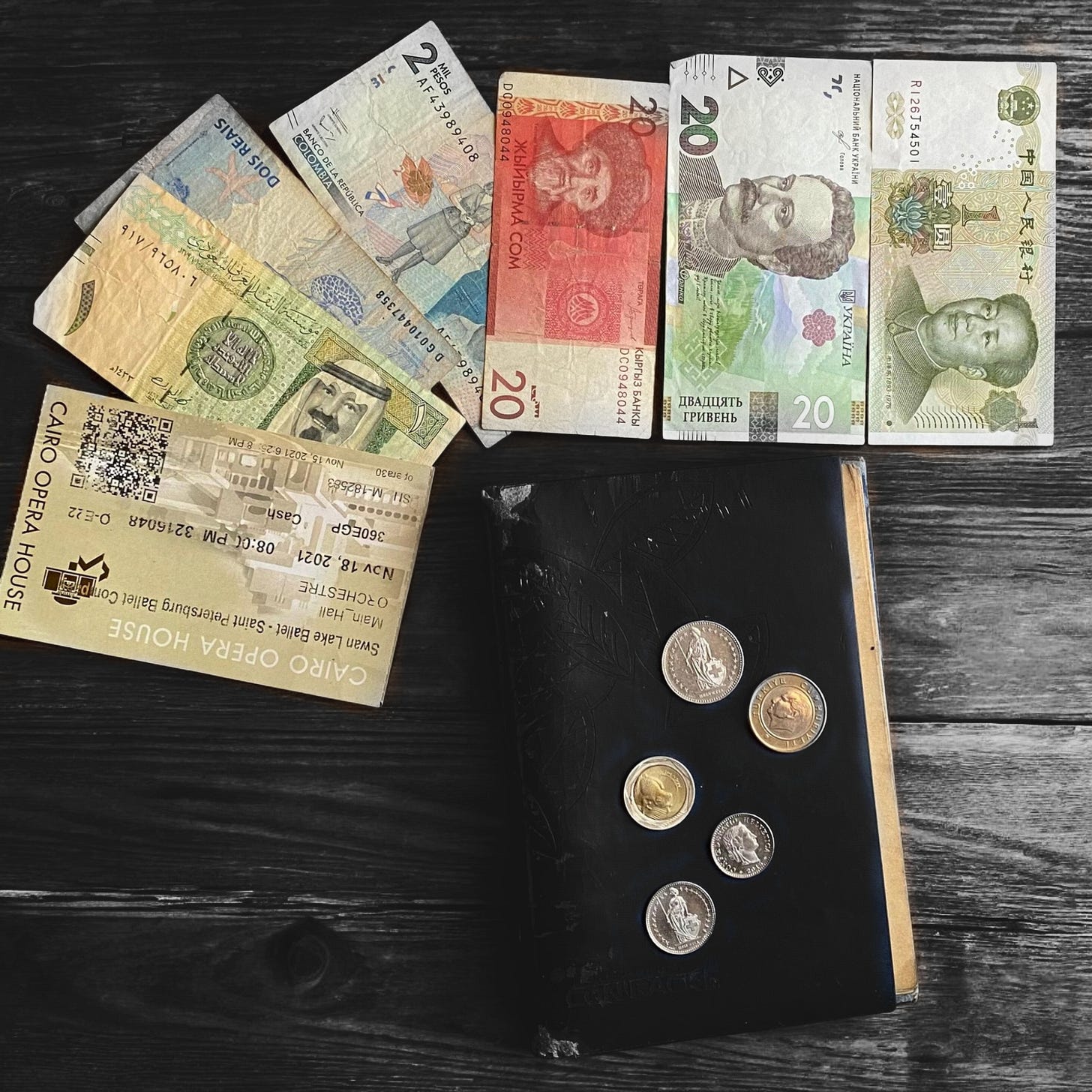
I keep people. Not in the way museums do. I keep them in names, in relics, in screenshots, in brief notes, in the small things they leave behind. When I meet someone, I write their name in a notebook, usually followed by a thought: First impression, what they looked like, what they wore, how they might disappear from my life.
It started as a trick to remember faces, to make sense of teachers who were strangers behind school desks. Now it’s a hobby I don’t usually admit to. I have a drawer full of relics: Chinese yuan from a girl I never kissed, a Kyrgyz som from a coworker who wanted to experience the world and escape her tribe, a ticket from a ballet concert with someone I almost loved, a wooden keychain from one I couldn’t stand, a subway ticket from a city I’ve never visited. Each object carries someone else’s air. When I touch them, or look at them, it feels as if I’ve traveled to places without ever leaving my room.
I don’t collect them because I miss people. I do it because something in me insists on keeping proof that they existed, that I once crossed their orbits. Most of them are gone now: dead, forgotten, or living somewhere I’ll never go. Some I only met once but couldn’t forget. Other I spoke for months. The majority are friendships that were kept for years but they all end up reduced to a note: Talks too fast, smells like rose, has eyes that pretend not to know.
Some relics arrive without effort, tucked into the edges of my life. Others I invite: ‘Will you leave something for me that I can keep?’ and they offer what they can, a coin, a keychain, a note in their mother tongue, which I never translate. Afraid that memory alone might not be enough, I keep them all.
If I can’t keep a physical trace, I keep what’s left: A text, a picture, a screenshot. One cold evening in Brussels, while searching for my way, I stopped someone to ask for directions. She offered to walk me there. In that brief walk, she told me about her years living in Belgium, that she was Albanian, that she missed her family. She asked if I was studying here, if I’d be back soon. I told her it was my last day in the city. She paused, smiled, and suggested we stop for coffee. Then she was gone.
The only proof I have of her existence is a fading memory and the coffee bill we shared. So I kept it.
I store them like someone saving seeds before a famine. A private archive of faces, words, relics, wrappers, and bills. No one would know what they meant, except me.
Sometimes I don’t think I’m collecting people but pieces of myself. The way I looked at them, who I was before I met them, and what I became in their presence. When I read the notes, I remember each encounter and follow bits of myself. The collector becomes a part of the collection.
There’s comfort in this. To know every gesture, every brief exchange; even dislike or indifference leaves a residue. The archive keeps growing, new names, new handwriting, new currencies, new relics. It doesn’t make me lonelier or closer, it just makes their memory stay longer before they fade.
I’ve traveled widely through these objects. I’ve revisited conversations I barely remember, arguments I wish I’d managed differently, actions I missed out on taking, or gestures that passed unremarked at that time. The drawer is a map, archive, time capsule. A way to carry a world in the palm of my hand, or in the pages of my notebook.
Even on a quiet evening, I can pull a coin, a note, or a keychain, and be somewhere else, for just a moment. The objects remain, indifferent to me, and yet they are all I need to trail the outlines of a life that is both my own and the sum of countless others.
Adam T writes about desire, identity, and the moral gray areas of human connection. He draws from personal experience to explore how relationships shape, expand, and reveal who we are, often delving into the spaces between societal expectations and personal truth.




This was fascinating. I keep books because of this; titles alone don't help me remember, but holding a book does. How lovely to keep people this way.
Adam, this is so beautiful. I love the ways in which physical mementos hold the stories and essence of the people attached to them. It feels like they're an anchor to your memories, grounding them back to a single focus point.